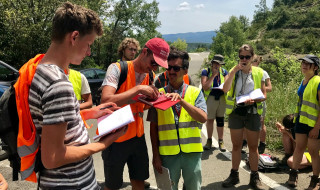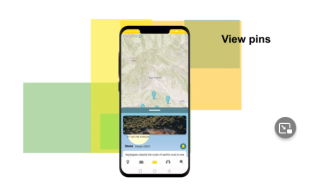"Looking at the opportunities presented by technology"
Feedback app fieldwork piques students' curiosity
When studying earth sciences, fieldwork should not be missing. Yet this component is under pressure due to a shortage of lecturers with a field geology background and an increase in students. Utrecht University developed an app that supports students in supervising fieldwork, allowing the lecturer to focus on the complex questions and reflection.
Creator of the app João Trabucho Alexandre is associate professor at Utrecht University's Faculty of Geosciences. He sees that the quality of field education has been increasingly compromised over the past 20 years. "There are more and more students choosing Earth Sciences. And there are fewer and fewer lecturers with a field geology background. In fact, our department has become broader, with many colleagues having a background in physics or chemistry. This makes the teaching fit well with contemporary issues, but it also means that there are fewer and fewer lecturers who can supervise a field study," says Trabucho.
Technology as solution to teacher shortage
At some universities, this even led to field teaching being abolished altogether. Others have reduced it sharply. Trabucho wanted to look at the opportunities offered by technology. "Students are almost intertwined with their mobile phones. So my first thought was: can we develop an app that guides students during their fieldwork?" He discussed the idea with colleagues and students and worked closely with Prof Hans de Bresser from the start. They looked at several apps for inspiration and quickly came to the conclusion: it should not be a 'show & tell' app, but one that supports you when needed. "Because if the app is leading, students will only look at their phones, whereas I want them to look at the composition of the earth's layers," says Trabucho. So the idea was born to develop a buddy, a buddy that students can ask questions to. In other words, an application that stimulates their curiosity and challenges them to explore. Trabucho: "In this ideation, the students played a crucial role. We actively involved them. After all, they are the target group and they can sense much better than us what works or doesn't work for their generation."
Overly ambitious proposal
Trabucho made a Comenius application, which was not granted. But he refused to sit back. "In the meantime, I had further sharpened my idea. So I modified the proposal and submitted it to SURF for a grant under the open and online education incentive scheme." This time, he was successful. SURF had a useful tip that he took to heart: make sure you make choices early to make enough progress and have concrete deliverables. "After all, they did think my proposal was very ambitious. It did not seem feasible to them in two years," he laughs.

Utrecht companion to the earth
App development by computer science students
The project had not yet started or Covid broke down. The whole schedule had to be rescheduled. Trabucho: "We planned to go to Spain first and shoot footage for the app there. But travel restrictions forced us to revise that. We decided to develop a basic app and only add the content later."
He poked his light at his colleagues in the Department of Computer Science. Trabucho: "Of course, I could have gone to an app development agency, but I knew that undergraduate Computer Science students had to develop an application for their final assignment. This turned out to be an excellent project for such an assignment."
The development was done in two rounds, as it was too much work to pour into one final assignment. The first group of 10 students focused on the challenge of positioning yourself on a topographic and a geological map and switching between the two. An issue that Trabucho had completely underestimated. "I use Google Maps quite a lot and it seems so simple, but it turns out to be incredibly complicated to position yourself on a map via GPS. Moreover, it had to be a map that you could also download to your device, because in the areas where we do research, you don't have coverage everywhere. It took us 10 months to tackle this problem."
"A clever man learns from his own mistakes, a wise man learns from others' mistakes"
Sounding board
He drew from this a wise lesson he once learned from his father, but had forgotten somewhere along the way: a smart person learns from his own mistakes, a wise person learns from other people's mistakes. "That is why I set up a sounding board group of people who have a lot of experience in software development. They guided the second group and shared their knowledge." Based on the maps, the second group developed a digital fieldbook where students can find all kinds of information about that specific location and upload their own material. The functionality of that fieldbook is finished, but the content itself has yet to be created. "We are starting work on that now. We hope to deploy the app for the first time this academic year."

Becoming a guiding country
Trabucho concludes with an appeal to the OCW minister. "Digital teaching tools are the future. Do we as the Netherlands take a wait-and-see attitude and let parties like Google determine what our learning resources will look like in the future? Or do we become a guiding country ourselves by developing open access and open source learning materials, with the direction being in the hands of our own teachers and students?"
He himself would like to share his knowledge with other universities that do a lot of fieldwork, think Wageningen, Delft or VU Amsterdam. "Because now that our app is there, you can translate it relatively easily to other disciplines where you have the same challenges."
Getting started yourself?
Would you like to get started with the materials developed in this project? Read more about The Utrecht companion to the earth.
More about the Open and Online Education Incentive Scheme
This project was realised with help from the Open and Online Education Incentive Scheme. View more results from the scheme's projects.
